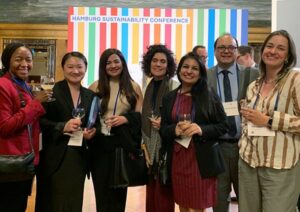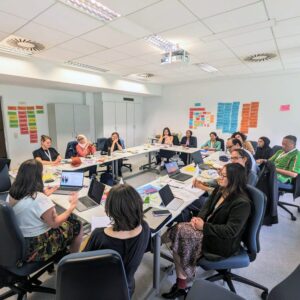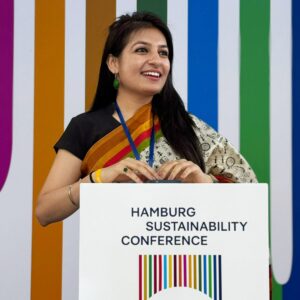The IDOS Managing Global Governance (MGG) Network joined high-level discussions at the HSC. In a workshop hosted by the University of Hamburg, as part of a side event, participants explored training approaches to build multi-stakeholder competences in public administration.
 A delegation from the Managing Global Governance (MGG) Network participated in the Hamburg Sustainability Conference (2-3 June). The group with members from South Africa, Indonesia, India, China, Mexico and Brazil participated in the high-level discussions at the conference and brought in their respective perspectives on the conference topics, such as Germany’s relations with the countries of the Global South, or the use of AI for the achievements of the SDGs.
A delegation from the Managing Global Governance (MGG) Network participated in the Hamburg Sustainability Conference (2-3 June). The group with members from South Africa, Indonesia, India, China, Mexico and Brazil participated in the high-level discussions at the conference and brought in their respective perspectives on the conference topics, such as Germany’s relations with the countries of the Global South, or the use of AI for the achievements of the SDGs.
In direct continuation of the Hamburg Sustainability Conference, taking the form of an HSC Side Event, a workshop in the MGG work strand on ‘Training and Learning’ focused on multi-stakeholder processes (4-6 June). The workshop was hosted by the University of Hamburg. It reflected on the HSC as a multi-stakeholder process (MSP) and transferred insights on MSP to the area of training and learning in the public sector. The interactive workshop brought together professionals engaged in multi-stakeholder processes as well as experts from schools of public administration and other training institutions for civil servants. Among them: The National School of Government (NSG) from South Africa, the Institute for Sustainable Development Goals of Tsinghua University in China, Lembaga Administrasi Negara Rebulic Indonesia, and the National School of Public Administration (ENAP) from Brazil.

The overarching aim of the workshop was to identify leverage points to strengthen the competences of civil servants to successfully design and implement multi-stakeholder processes. Systemic approaches, including a diversity of knowledge, perspectives and actors are key for sustainable development. Multi-stakeholder processes hold great potential to enhance mutual learning, integrate diverse perspectives, and develop more inclusive and effective solutions. At the same time, they pose practical challenges — such as managing conflicting interests, navigating power dynamics, and ensuring long-term engagement. Leveraging the potential of diversity is ambitious and needs a specific set of competences.
Throughout the workshop, emphasis was put on informal exchange and mutual learning. The workshop offered a space to share real-life examples, identify barriers, and brainstorm concrete actions to enhance competence development. Ultimately, this exchange will help to further shape the shared agenda for strengthening the public sector’s role in driving effective multi-stakeholder collaboration for sustainable development.

The workshop “Training for Transformation: Building Multi-Stakeholder Competences in Public Administration” was organised by the German Institute of Development and Sustainability (IDOS) in the framework of the Managing Global Governance (MGG) programme, hosted by the University of Hamburg, and implemented with financial support from the Federal Ministry for Economic Cooperation and Development (BMZ) and the Ministry of Science and Culture of the State of North-Rhine Westphalia.
See a short video review from our participants: https://www.linkedin.com/posts/johanna-vogel-idosresearch_hsc-mgg-hsc-activity-7338520724292206595-cm4H?utm_source=share&utm_medium=member_desktop&rcm=ACoAAELUgBoBXxu5m4efyF0e-jq1TAX0FIfi6vI
©IDOS

Schreibe einen Kommentar